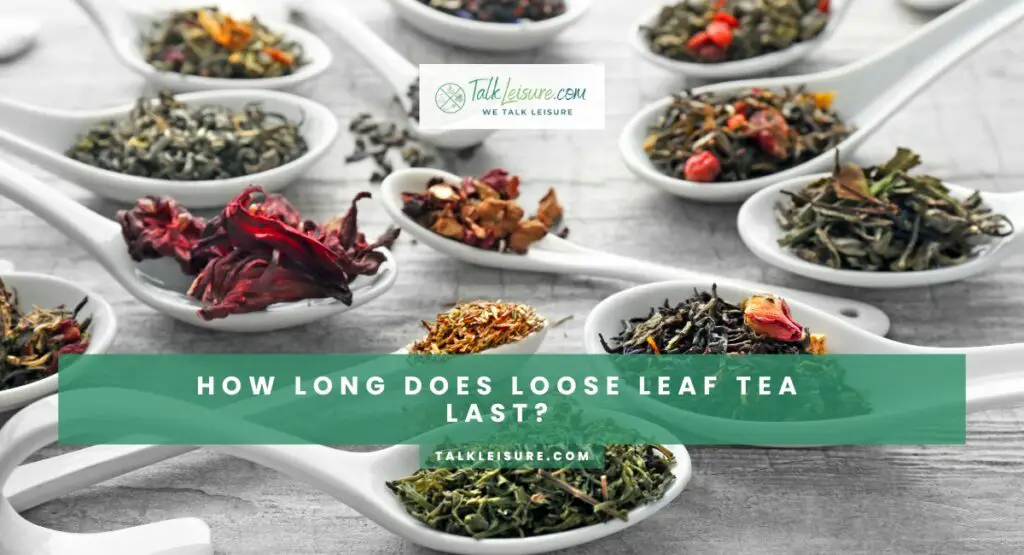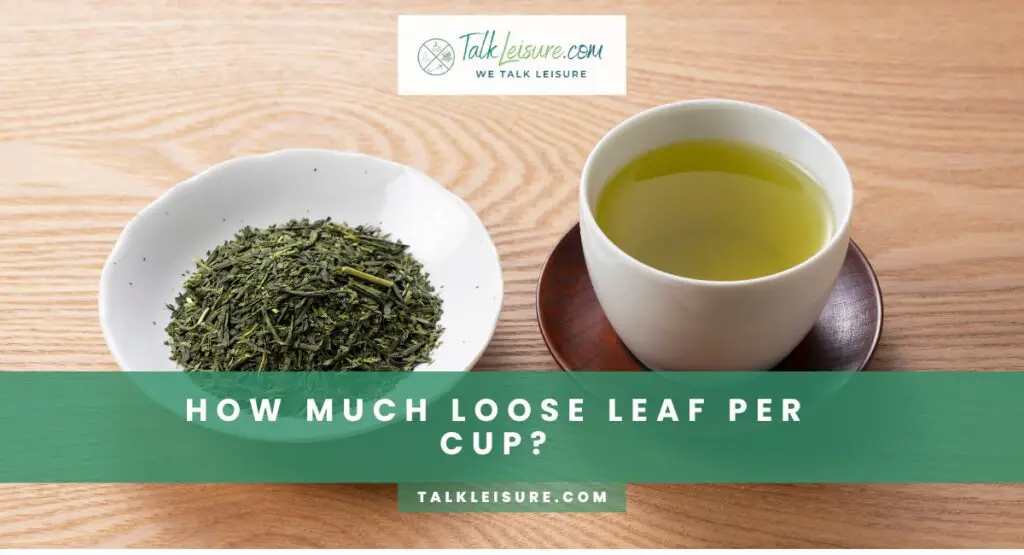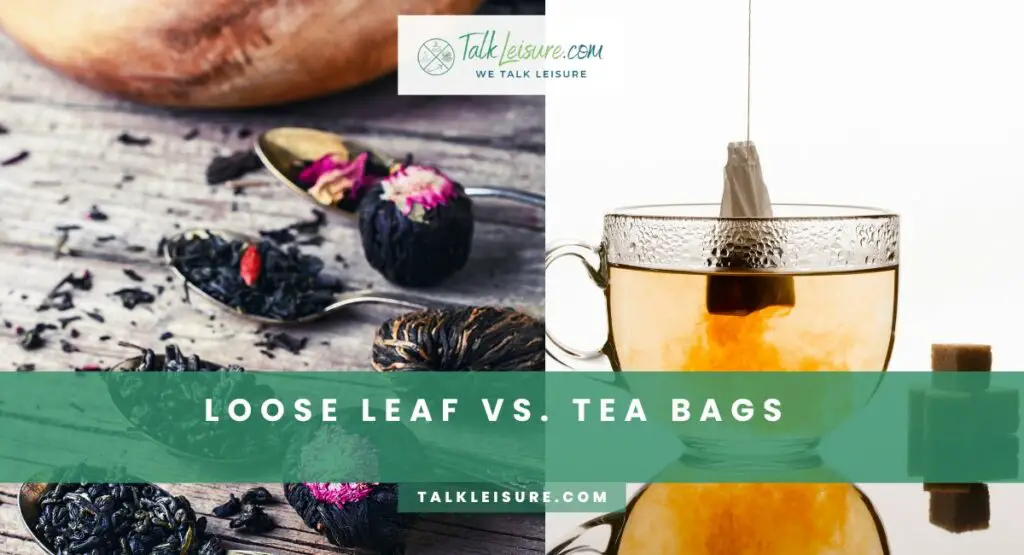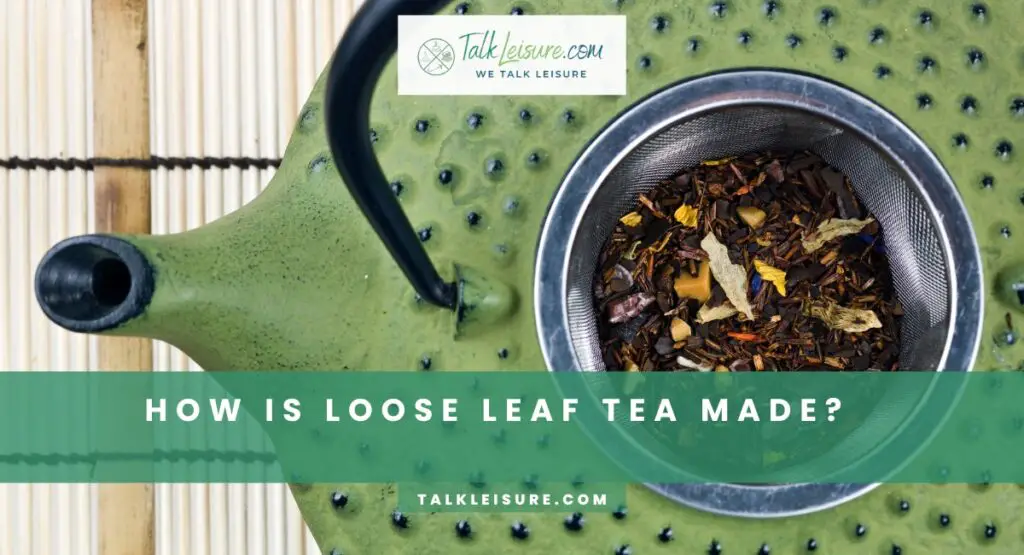Do you love indulging in the soothing ritual of a warm cup of loose-leaf tea? If so, you might have wondered: how long does loose-leaf tea last?
Whether you’re a tea enthusiast or just someone who enjoys a comforting cup now and then, understanding the shelf life of your loose-leaf tea is essential.
Loose-leaf tea can last 6 months to 2 years or more, depending on the type and storage conditions. Properly stored in an airtight container away from light, heat, and moisture, it maintains better flavor and quality.
In this article, we’ll delve into the factors that influence the longevity of your tea leaves and provide some handy tips to ensure you’re always sipping on the freshest and most flavorful brews.
Does Tea Expire?
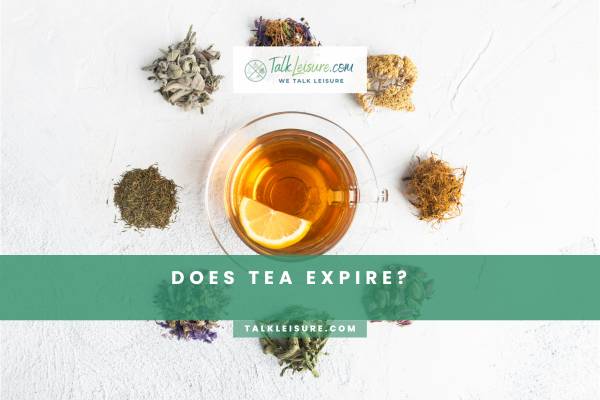
Many tea lovers may wonder if tea can go wrong or expire.
Tea can expire, losing flavor and quality due to exposure to air, light, and moisture. The expiration date indicates optimal freshness, but tea can remain drinkable past it if stored well.
The good news is that tea, both loose-leaf and tea bags, do not have an expiration date in the traditional sense.
However, the flavor and quality of tea can deteriorate over time. In this article, we will focus on the shelf life of loose-leaf tea and the factors that can affect its freshness.
Shelf Life Of Loose Leaf Tea
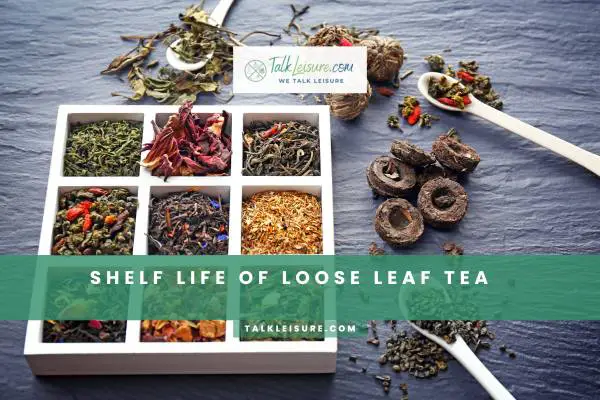
The shelf life of loose-leaf tea can vary depending on several factors, including the type of tea, storage conditions, and processing methods. Generally, loose-leaf tea can last anywhere from six months to two years if stored properly.
Table with more information about different loose-leaf teas:
| Tea Type | Shelf Life (approx.) | Optimal Storage Conditions | Aging Potential | Caffeine Content | Flavor Profile |
|---|---|---|---|---|---|
| Black Tea | 2-3 years | Cool, dry, and airtight | Minimal | Moderate to High | Bold, robust, malty, sometimes with fruity notes |
| Green Tea | 1-2 years | Cool, dry, and airtight | Limited | Moderate | Fresh, grassy, vegetal |
| White Tea | 1-2 years | Cool, dry, and airtight | Limited | Low | Delicate, floral, subtle |
| Oolong Tea | 1-3 years | Cool, dry, and airtight | Moderate to High | Moderate to High | Wide range – from floral to toasty |
| Pu-erh Tea | 10+ years | Cool, dark, and well-ventilated | Significant | Moderate to High | Earthy, mellow, develops complexity with age |
| Herbal Tea | 1-2 years | Cool, dry, and airtight | N/A (Does not age) | Caffeine-free | Varies based on herbs used |
| Rooibos Tea | 2-3 years | Cool, dry, and airtight | N/A (Does not age) | Caffeine-free | Sweet, nutty, naturally caffeine-free |
| Yerba Mate | 1-2 years | Cool, dry, and airtight | Limited | Moderate | Grassy, herbal, sometimes smoky |
Please remember that the shelf life mentioned above is approximate, and the actual duration can vary based on how well the tea is stored.
Aging potential refers to how well the tea can improve with time if stored properly.
Caffeine content varies between teas, with some being high in caffeine (like black and oolong) and others being caffeine-free (like herbal and rooibos).
Flavor profiles are subjective and vary based on tea processing and individual preferences.
Read more about loose-leaf tea with us.
Conditions Affecting For The Shelf Life Of Loose Leaf Tea
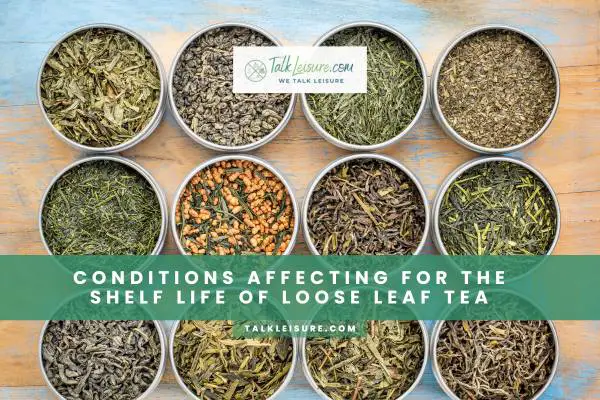
Exposure to Air: Loose-leaf tea is sensitive to air, moisture, and odors. Exposure to air can lead to oxidation, which can cause the tea to lose its flavor and aroma more quickly. To prevent this, storing loose-leaf tea in an airtight container is crucial.
Light: Excessive exposure to light, especially sunlight, can also deteriorate flavor. It is recommended to store loose-leaf tea in a dark and cool place, away from direct light.
Moisture: Moisture can speed up the deterioration process of loose-leaf tea. It is important to keep the tea leaves dry and avoid storing them in humid environments. A moisture-proof container or airtight bag can help to prevent moisture absorption.
Heat: High temperatures can negatively impact the quality and taste of loose-leaf tea. It is best to store tea in a cool and temperature-controlled environment.
Odors: Loose-leaf tea can absorb odors from its surroundings. It is recommended to keep tea away from strong-smelling items such as spices or cleaning products.
How Long Does Loose Leaf Tea Last?
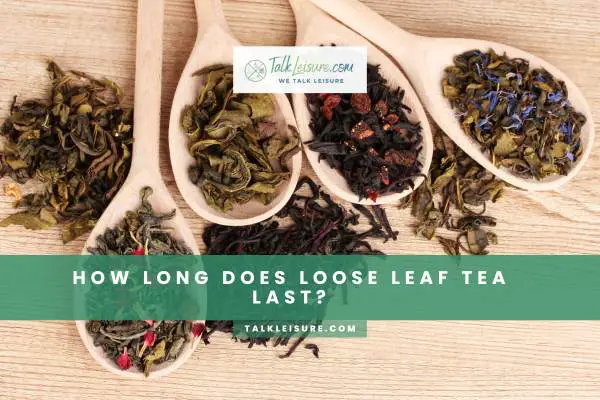
As mentioned earlier, the shelf life of loose-leaf tea can vary depending on various factors.
While it does not expire, the tea’s flavor and aroma can begin to deteriorate over time.
Here is a general guideline on the shelf life of different types of loose-leaf teas:
Green Tea: Green tea is known for its delicate flavor and antioxidants. Consuming green tea within 6-12 months is recommended for the best taste.
White Tea: White tea is the least processed tea with a subtle, natural flavor. It can generally be enjoyed for up to 2 years.
Oolong Tea: Oolong tea falls between green and black tea in terms of oxidation. It can retain its quality for up to 12-24 months.
Black Tea: Black tea has a bolder flavor profile and is more oxidized. It can stay fresh for 2-3 years if stored properly.
Pu-erh Tea: Pu-erh tea is a fermented tea with unique aging properties. It can improve in flavor and complexity with age. Some aged pu-erh teas can be enjoyed for decades.
It is important to note that these are general guidelines, and the quality of tea can vary depending on its source and processing methods. Always trust your senses and taste the tea to determine if it is still enjoyable.
How To Tell If Your Loose Leaf Tea Is Fresh?

To determine the freshness of your loose-leaf tea, consider the following:
Appearance: Look for vibrant and intact tea leaves. Faded or broken leaves may indicate stale tea.
Aroma: Fresh tea should have a pleasant and inviting aroma. The tea may have lost its freshness if it smells musty or dull.
Color: Different types of teas should have their characteristic colors. For example, green tea should be vibrant green, while black tea should be dark and rich. The tea may not be at its best if the color appears off or faded.
Taste: Ultimately, the taste of the tea is the most important factor. Brew a small amount of the tea and pay attention to its flavor. If the taste is dull or lacks the desired characteristics, it may be time to replace the tea.
Loose-leaf tea does not expire but can lose its flavor and aroma over time.
Proper storage in airtight containers, away from light, moisture, and other strong odors, can help prolong the shelf life of loose-leaf tea.
Please pay attention to the tea’s appearance, aroma, color, and taste to ensure it is still fresh and enjoyable. So brew a cup of your favorite loose-leaf tea, and savor the moment!
How Long Does Your Loose Leaf Tea Last?
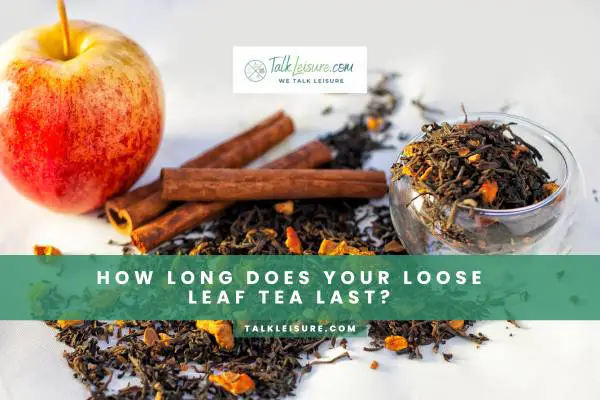
Loose-leaf tea can stay fresh for a surprisingly long time if stored properly. On average, it remains flavorful for about 6 months to a year.
The key is to keep it in an airtight container, away from light, heat, and moisture.
This helps preserve its delicate flavors and aromas.
Over time, tea might lose some of its original taste, but it will be alright. If you notice a faded smell or muted taste, it’s a sign that the tea is past its prime.
So, enjoy your loose-leaf tea within that timeframe to savor the best of its flavors!
Does Loose Leaf Tea Go Bad?
If you are a tea enthusiast, you know that loose-leaf tea offers a superior flavor and aroma compared to tea bags.
However, if you have a large stash of loose-leaf tea, you may wonder how long it will stay fresh.
Does loose-leaf tea go bad?
The answer is yes and no. Loose-leaf tea does not spoil or become unsafe to consume, like dairy or meat products, but it can lose its flavor and quality if not stored properly.
When properly stored, loose-leaf tea can have a respectable shelf life, maintaining its flavor and aroma for an extended period. On average, loose-leaf tea can last anywhere from 6 months to 2 years.
The shelf life greatly depends on the type of tea, storage conditions, and quality.
Green and white teas are less oxidized and have a shorter shelf life than black and oolong teas.
However, to get the most out of your loose-leaf tea, storing it in an airtight container away from light, heat, and moisture is crucial.
Here is a table comparing the approximate shelf life of different tea types:
| Tea Type | Shelf Life |
|---|---|
| Green Tea | 6-12 months |
| White Tea | 6-12 months |
| Oolong Tea | 1-2 years |
| Black Tea | 1-2 years |
| Pu-erh Tea | Indefinite (Ages well) |
Please note that these are general guidelines, and the actual shelf life of loose-leaf tea can vary depending on individual factors. Always trust your senses; if the tea has gone stale or lost its aroma, it’s best to replace it with a fresh batch for a delightful tea experience.
How Long Is Loose Leaf Tea Good For After Opening?
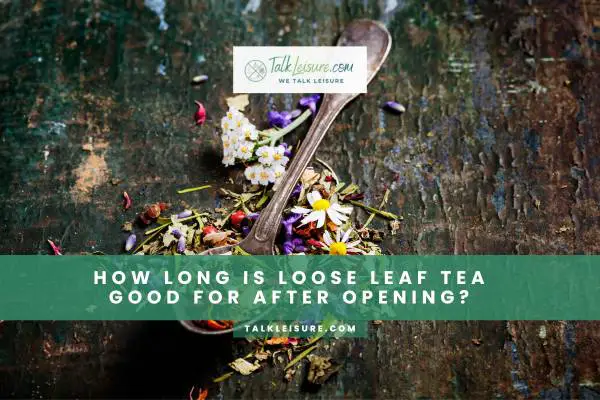
The shelf life of loose-leaf tea can vary depending on various factors, such as the type of tea, storage conditions, and processing methods.
Generally, most loose-leaf teas can last about 6 months to a year after opening. In contrast, some high-quality teas can remain flavorful for up to 2 years.
However, it’s important to note that the flavor and aroma will gradually diminish as time goes on.
When Should I Throw Out Loose Leaf Tea?
While loose-leaf tea doesn’t necessarily go wrong in the sense of becoming unsafe to consume, some signs indicate it’s time to throw it out.
Suppose you notice that the tea has developed a peculiar or unpleasant odor or has been exposed to moisture and developed mold.
In that case, it’s best to discard it. Similarly, if the tea leaves have lost their vibrant color or stale taste, it’s time to replace them with fresh tea.
Factors that affect the shelf life of loose-leaf tea
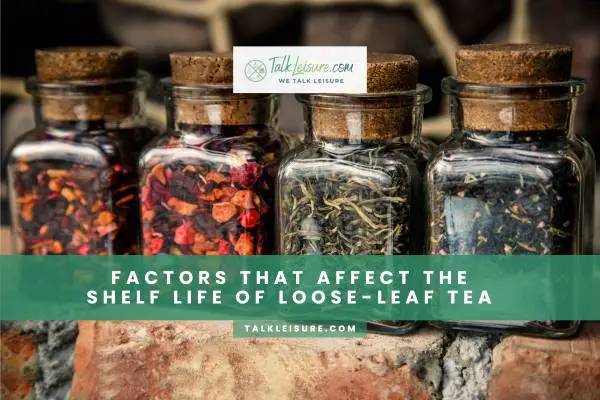
Several factors can impact the shelf life of loose-leaf tea. These factors include:
Oxidation: Tea leaves can oxidize when exposed to air, leading to a loss of flavor and quality. Properly sealing the tea leaves in an airtight container can help slow oxidation.
Moisture: Exposing loose-leaf tea to humidity can cause it to spoil quickly. Keeping the tea leaves dry and away from humid environments is crucial.
Temperature: Tea leaves are sensitive to temperature changes. Storing them in a cool and dark place can help preserve their flavor and aroma.
Light: Exposure to sunlight can degrade the quality of loose-leaf tea. It’s best to store tea in opaque containers or dark places.
Read more about loose-leaf tea with us.
Can You Reuse Loose Leaf Tea Leaves Next Day?
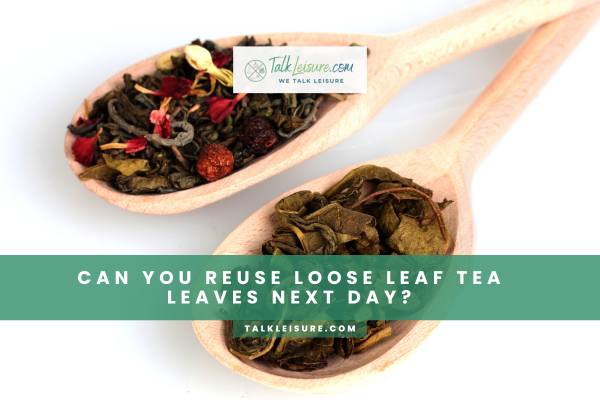
Yes, you can reuse loose-leaf tea leaves the next day, but it’s important to note that the second infusion may not be as flavorful as the first one.
Some tea varieties, such as oolong and pu-erh, can withstand multiple inputs and improve flavor with each steeping.
However, delicate teas, like green and white teas, may lose flavor after the first infusion. It’s best to experiment and adjust the steeping time and temperature to suit your taste preferences.
How Often Can You Reuse?
The number of times you can reuse loose-leaf tea leaves depends on the type and quality of the tea.
Higher-quality teas typically yield more infusions, while lower-quality teas may lose their flavor after the first or second steeping.
It’s best to follow the brewing instructions specific to the type of tea you are using and adjust the steeping time and temperature accordingly.
Is It Safe To Drink Old Loose Leaf Tea?
While drinking old loose-leaf tea is generally safe, it’s essential to consider its quality and flavor.
Tea may lose its aromatic compounds and antioxidants as it ages, resulting in a less enjoyable drinking experience.
Drinking old tea won’t harm you if the tea leaves have been stored correctly and show no spoilage.
However, for the best flavor, consuming tea within its optimal freshness period is recommended.
How To Store Loose Leaf Tea To Keep It Fresh?
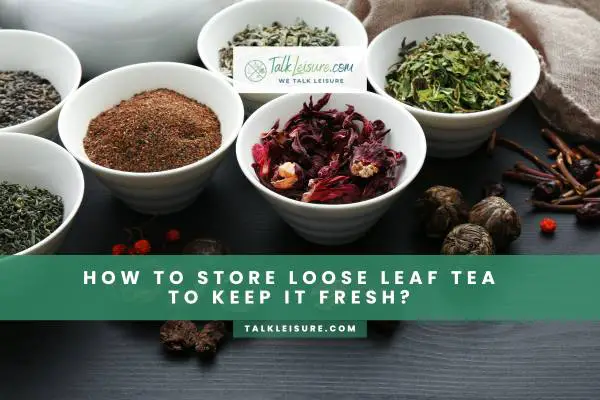
To maximize the shelf life and freshness of your loose-leaf tea, here are some tips for proper storage:
Use airtight containers: Transfer your loose-leaf tea to airtight containers, such as glass jars or tin canisters, to protect them from air and moisture.
Store in a cool, dry place: Keep your tea away from heat, sunlight, and moisture. A pantry or cupboard away from the stove or direct sunlight is an ideal storage spot.
Avoid odor contamination: Tea leaves can absorb odors from their surroundings, so keep them away from strong-smelling spices or household chemicals.
Don’t store in the refrigerator: While refrigeration may seem like a good idea, storing tea in the fridge can introduce moisture and affect the tea’s flavor.
How Long Does Every Type Of Tea Last?
The shelf life of different types of loose-leaf tea can vary. Here’s a general guide to how long each kind of tea typically lasts:
- Green Tea: 6-12 months
- Black Tea: 2-3 years
- Oolong Tea: 1-3 years
- White Tea: 1-2 years
- Pu-erh Tea: 10+ years
These are rough estimates, and the actual shelf life can depend on various factors, including the tea’s quality, storage conditions, and processing methods.
What To Do With Old Tea?
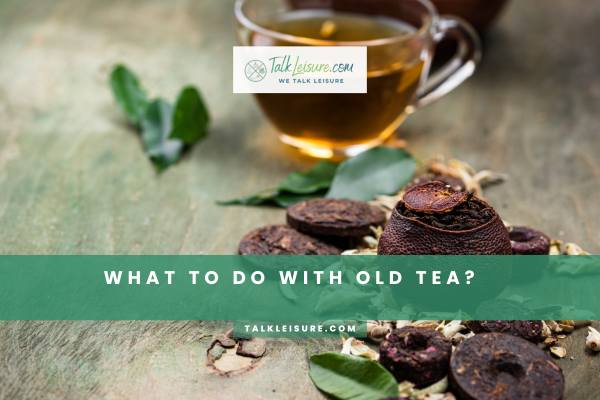
If you have leftover tea that’s gone cold or won’t drink, don’t let it go to waste! There are a few smart things you can do with it.
First, you can use it as a natural fertilizer for plants; they’ll love the nutrients.
Also, you can put the cold tea in a spray bottle and use it to clean surfaces like glass or wooden furniture.
Another option is to use it as a hair rinse for added shine and softness. If you have tired eyes, soak cotton pads in chilled tea and place them over your eyes for a soothing effect.
Lastly, you can pour old tea down the drain to help eliminate odors.
Not only that you find yourself with old, stale loose, leaf tea that you don’t want to drink, there are other ways to put it to good use:
Composting: Tea leaves can enrich your compost pile when mixed with other organic materials.
DIY beauty treatments: Used tea leaves can be repurposed for skincare as facial masks or eye treatments.
Natural cleaning: Tea leaves can be brewed and used as a cleaning solution for windows or surfaces.
Customer Experience With The Shelf Life Of Loose Leaf Tea
Many tea enthusiasts have shared their experiences with the shelf life of loose-leaf tea.
Some have found that adequately stored tea maintains its quality and flavor for longer than expected.
In contrast, others have noticed a gradual decline in taste after a few months. T
Many different teas from reputable sources and experiment with storage methods to find what works best.
Final Thoughts
While loose-leaf tea doesn’t necessarily go bad, it can lose its flavor and quality over time.
You can extend your freshness by storing tea in airtight containers, away from moisture, heat, and light.
Remember, the shelf life of loose-leaf tea differs depending on the type and quality of the tea.
Experimentation and exploration are key to finding the best brewing techniques and storage methods for your favorite loose-leaf tea. Enjoy your tea while it’s freshest, and savor the experience it brings.
FAQ
Can Loose Leaf Tea Spoil?
Yes, loose-leaf tea can spoil, but it takes longer than other perishable items. Over time, air, light, and moisture exposure can degrade its flavor and aroma. Proper storage in an airtight container away from sunlight and humidity can help preserve the tea’s freshness for longer.
What Are The Disadvantages Of Loose Leaf Tea?
The disadvantages of loose-leaf tea include its relatively higher cost than tea bags and the need for additional equipment like tea infusers or strainers. Loose-leaf tea may also be less convenient for those who prefer the simplicity of tea bags. However, many tea enthusiasts believe that loose-leaf tea’s superior taste and quality outweigh these drawbacks.
Can You Reheat Loose Leaf Tea?
Yes, you can reheat loose-leaf tea, but it’s not recommended. Reheating can lead to a loss of flavor and make the tea taste bitter or astringent. Brewing only the amount of tea you intend to consume is better to ensure the best taste. If you have leftover tea, let it cool and store it in the refrigerator for iced tea.
How Do You Store Loose Leaf Tea After Use?
After using loose-leaf tea:
- Store it properly to maintain its freshness.
- Allow the tea leaves to cool down completely to room temperature.
- Transfer the remaining leaves into an airtight container, preferably glass or ceramic, away from direct sunlight and moisture.
Properly stored, loose-leaf tea can retain its flavor and aroma for an extended period. Avoid storing it in the fridge, as the tea can absorb odors from other foods.
Best Wishes!

